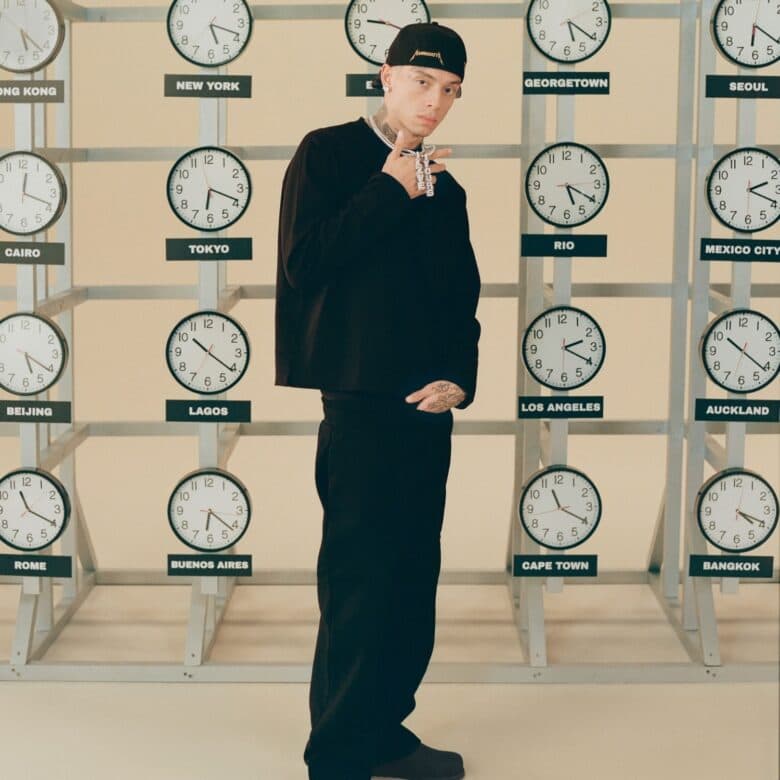Seven years later, The Maccabees are still doing it on their own terms

Picture the scene. It’s 2008 and you’re walking out of a screening of Angus, Thongs and Perfect Snogging. It’s a balmy summer’s day, but there’s only one thing on your mind — as soon as you get home, you’ll be hopping onto iTunes and downloading that song which plays right at the end, “Toothpaste Kisses” by The Maccabees. It will, by and by, soundtrack your teenage years, becoming the perfect musical backdrop to your fantasies about the person you fancy. That’s how most people my age will have come to know The Maccabees. Me? Bit different. Not quite Misery territory, but certainly a big fan.
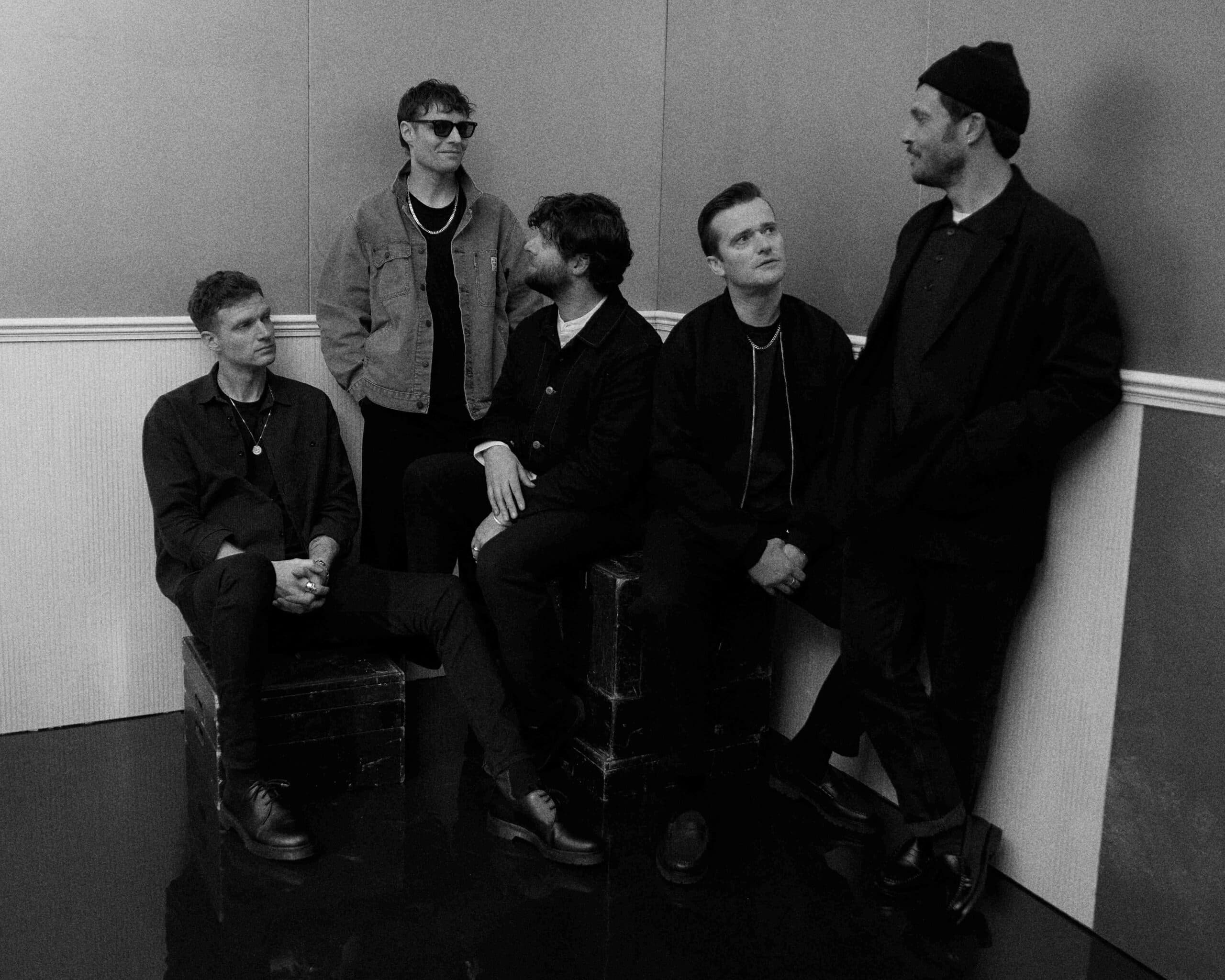
I was at the railings when they played Latitude festival in 2010, holding a sign for them — I was pulled out when the moshpit got a bit much for a 12-year-old, though it definitely wasn’t mental enough to substantiate that. Throughout my teenage years, I’d make music videos to their songs and upload them to YouTube. I was particularly persistent about them watching the one I did for “Can You Give It”, from their second album Wall of Arms — I hope to god they never actually did. I remember driving to the airport in France just as Marks To Prove It came out. As I listened I thought, you know what, young Amber was onto something — I’d made a good choice in having these guys as my ostensible “favourite” band. Come 2025, at the age of 27, I’m sitting across from the five of them in a meeting room at the HUNGER office. I’m about to interview them about their upcoming reunion. The day before, I’d gone to watch them in rehearsals. Yeah, full circle moment.


The rehearsals are the first time The Maccabees (formed by Orlando Weeks, Felix White, Hugo White, Rupert Jarvis and Sam Doyle) are getting together in this capacity since a series of farewell tours back in the summer of 2017. It was the previous summer that they announced they were disbanding, releasing a statement saying they’d “decided to call it a day” — that was just a year after their final album, Marks To Prove It. They’ve got to iron out some kinks before they headline All Points East festival come August, and it’s probably not helping having us shuffle into the room as they run through “Can You Give It”. We were told to just sneak in while they play, though they obviously bring everything to a halt and say hello. Felix says it himself when we’re on set for their shoot the next day: it was a bit awkward.
All things said, they clearly still gel. They don’t give the impression of a band that’s been away from one another for seven or so years. To thank for that, it’s Hugo, who got the five of them back together for a special one-off gig — his wedding. “It was one of the first times since we’d split up that we’d been in a room together,” he says. “We wouldn’t have got together and played a song without an occasion to do it.” A few conversations later (“I think it was vaguely on the cards — we’d begun speaking about it,” adds Orlando), and the offer from All Points East acting as the right “framework”, and here we are.
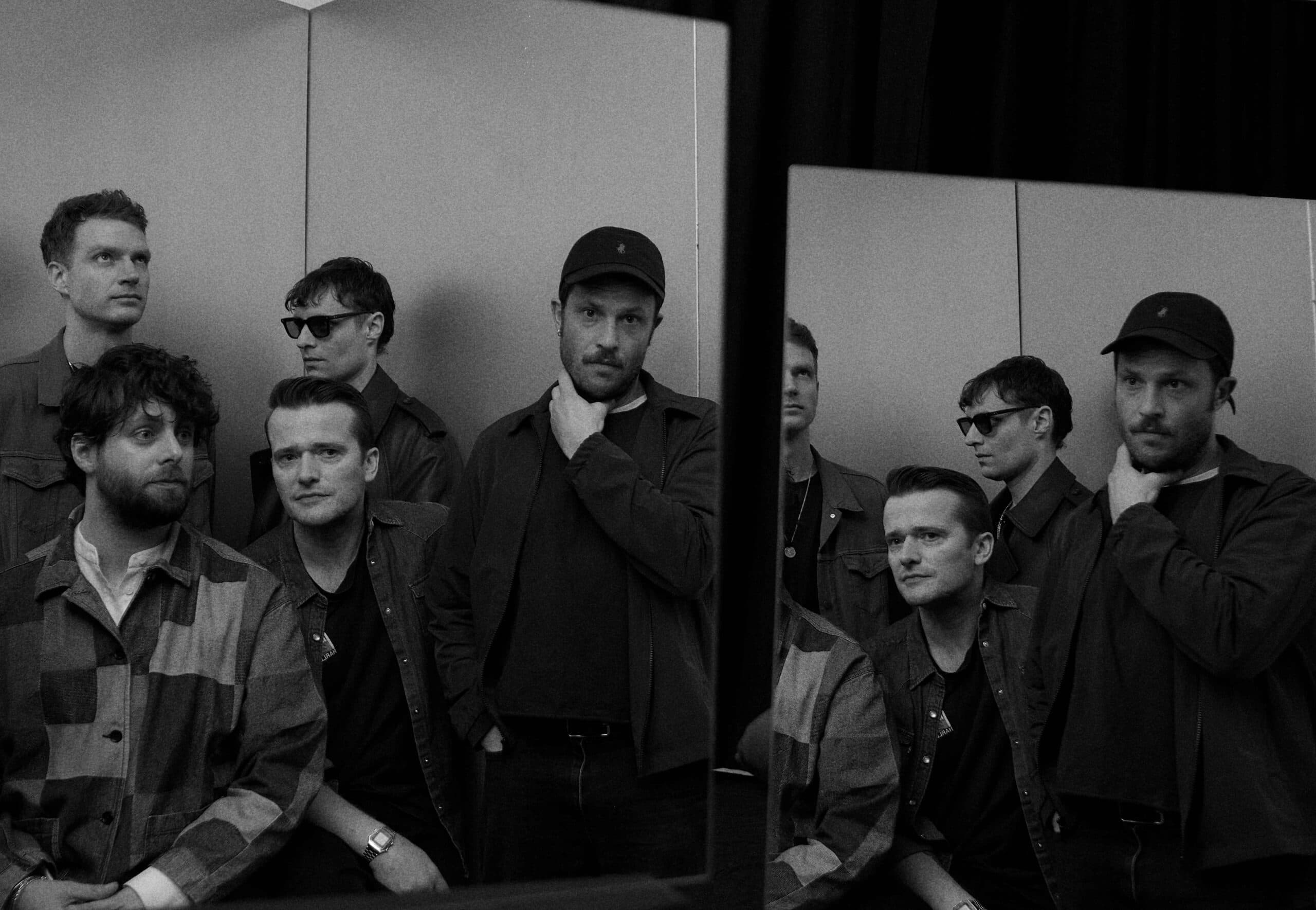
Timing also played a role. Hugo says that they needed “that breather.” “We weren’t going to do it again in two years or three years or four years or five years,” he continues. And from Felix’s side? Well, concerns about mortality. “It does just feel like you get to a certain age and you realise if you wanna do something, tomorrow’s not guaranteed.” Felix, who Orlando describes as the one that’s “much better at understanding what it is to have loved our band […] having grown up religiously reading the NME,“ is worried about quite a few things actually. “The only thing in my head was that it’s easy to love bands because they’re a bit mythical. You can’t touch it. By bringing it back to life, you’re putting it up for judgement again.” It’s safe to say the reunion has been well received, though. Off the back of the All Points East announcement, they’re now doing Glastonbury this summer and a whistle stop Europe tour. It’s been ten years since they last played Glastonbury, by the way. They have trouble remembering that — maybe Felix is right to be worried.

It is easy to paint band reunions with a certain paintbrush. I throw out that it can feel like “old fogies coming together.” “Is that what you thought when you heard?” Rupert asks, laughing. The idea of them only being in the same room because of Hugo’s wedding could even feel a little Gallagher-esque. But while it’s a complicated thing spending a whole ten years in each other’s pockets (“It’s a weird mixture of brotherliness and being in a kind of relationship, because you share everything,” says Orlando), they seem to agree — ending things was sad. “It’s like the most heartbreaking breakup,” says Felix. “No one’s fucking done anything. It’s not like, fuck you. You resist the temptation of doing that. You just have to face that it doesn’t work together — it’s horrible.” Sam describes it as being like “ending a relationship, but with four men.” “Four other men? What sort of relationship?” jokes Felix.
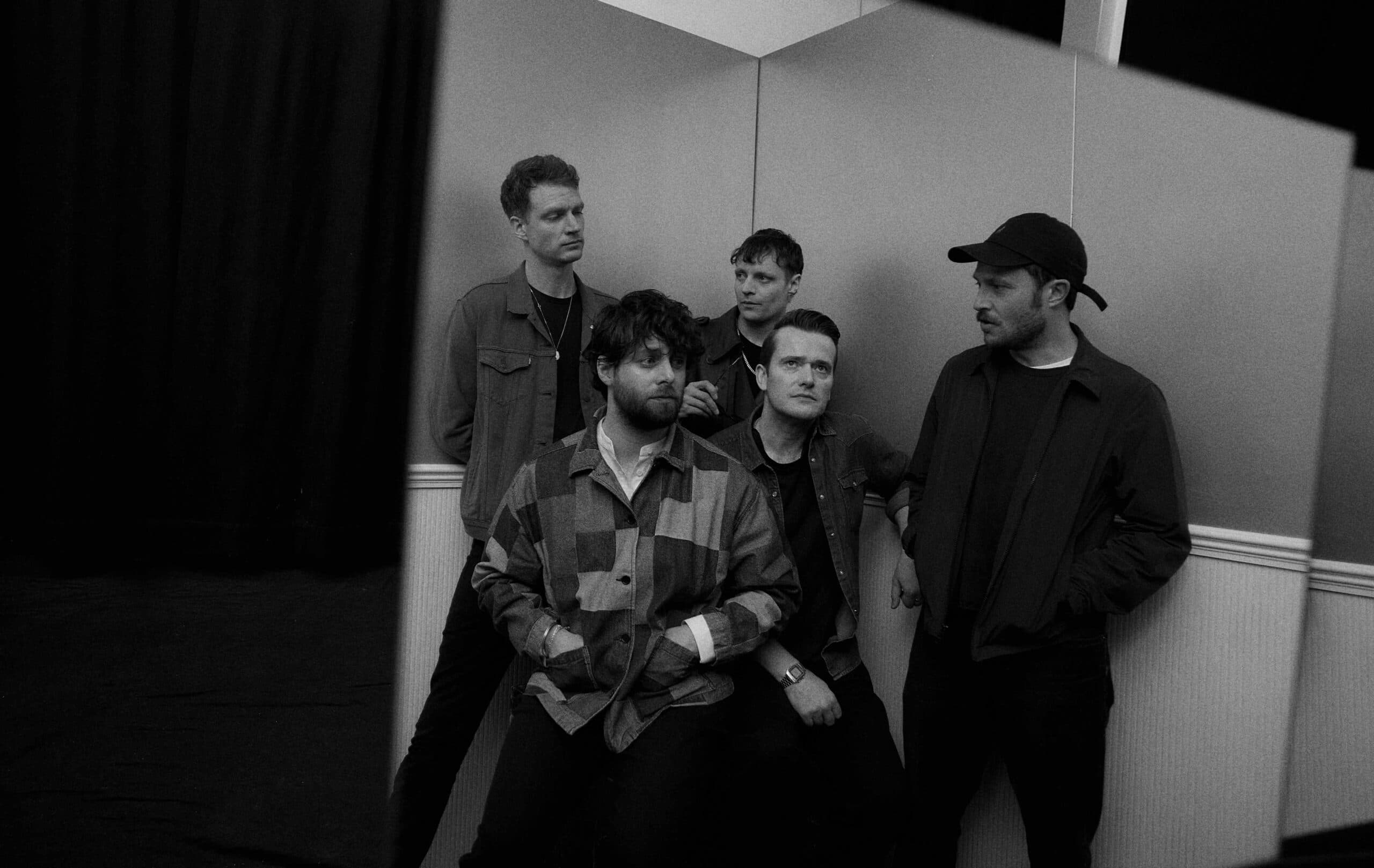
The reunion was certainly a gradual process. As Orlando puts it, “to begin with, it all felt very civil. It was complicated not being in a band together anymore, but then it became easier and friendlier and quicker.” “There isn’t any hatred. There isn’t anything like that. I didn’t hate anyone and we didn’t burn it all down. That’s not really in our nature,” he continues. “Being able to come back to it eight or nine years later, it’s a testament to the personalities in the band.” But for Orlando the end of The Maccabees was marred by “exhaustion.” When I ask if the reunion was a hard sell for anyone in the band, I’m somewhat directing it at the frontman. His life post-Maccabees has seen him publish The Gritterman (the accompanying score for the book features Paul Whitehouse as the titular character), three solo albums, a bit of art, and a move from London to Lisbon.
Orlando also got a new band together, and it was that which shed light on the, I guess, “magic” of The Maccabees. “I totally failed at making a record that sounds like a band. [The Maccabees] had already begun conversations about the reunion around that time and I remember thinking, oh, yeah, you can’t fake this. It definitely helped me when it came to reconciling — the luck we had as a group.” It’s been a process of rediscovery for all the boys, in fact. For Hugo, it was the “odd arrangements”: “after not listening to The Maccabees for such a long time, the thing that was apparent to me was the unique way that we worked.” For Felix, whose solo venture saw him link-up with his brother Hugo again for 86TVs, “having that distance and being able to hear the music for what it is, it was as if other people made it. I remember going, I actually really like that music.” For Sam, there was a newfound appreciation for the lyricism. “I nearly messaged you the other day because I don’t zone in on lyrics that much,” he says to Orlando. “There’s some beautiful words in there.”


And beautiful words there really are. “Learn to love a thriller so the words you leave me on my pillow read better / Cheap card forever,” sings Orlando on “Love You Better”, the first single from their second album, Wall of Arms. That’s a personal favourite of mine. There’s the not-so-beautiful (though, I think, fucking hilarious) lyrics too. Would they ever pop “Latchmere”, with its mention of “pedos”, on the All Points East setlist, I wonder? I don’t get a clear answer — maybe they’ll do that at Glastonbury. “Some of the words in those early records are clumsy,” says Orlando. “[The pedo line] just gets more mumbled over time. I scat it. But those words and things were a big part of understanding and developing as a band — it exists in the world and I can’t take it out of the world, even if there was a period where I would have quite liked it not to be in the world.” “That would be great if everyone had a button for that. Like, could that not be in the world? The first Maccabees album?” adds Felix.

There’s a certain “scrappiness”, as Orlando puts it, to Colour It In. It’s only now, though, that the band’s really appreciating that. “The way I think about listening to those songs we made when we were younger,” says Hugo, who was just sixteen when the band formed, “is that there’s something really special about them.” “We weren’t necessarily great players and didn’t really know what we were doing, but they came about through sheer force of determination.”
Back to “Latchmere” though. If “Toothpaste Kisses” earned its place in The Maccabees hall of fame thanks to Angus, Thongs and Perfect Snogging, it’s British sitcom The Inbetweeners that you’ve got to thank for elevating a song about “an otherwise pretty unremarkable leisure centre” to icon status. Elsewhere on the soundtrack for the show? A whole smattering of other songs from the noughties indie scene – think The Wombats and Jack Peñate – which The Maccabees have been pigeonholed into. “I don’t remember feeling particularly part of that. There were sections of the scene. Like, I remember feeling like all the New Rave fans were a scene, but we weren’t quite part of that. And then there was a kind of indie folk revival that we weren’t quite a part of. There was a kind of goth hair scene that we weren’t part of. I felt like we skirted lots of scenes,” says Orlando. The Maccabees occupy a kind of liminal space in the UK music scene, something that’s come full circle with All Points East. “I would say that the line up,” which features the likes of Bombay Bicycle Club, The Cribs, and Nilüfer Yanya, “feels quite Maccabees in that it is quite a lot of ‘almost part of a scene’ type bands,” he adds. “I think The Cribs would definitely try not to associate themselves with us,” adds Felix.

So, how did The Maccabees get to have their particular sound? It might come as a surprise, but from the land of drum and bass. “When we were first playing, it wasn’t popular to be into guitar music. We used to go out, and because everyone played drum and bass music, we learned to play guitar fast,” says Felix. “Coming up through that movement, it was surprising how loads of guitar bands had similar ideas — like, oh, there’s fucking Maxïmo Park from Sunderland. But because there was no internet, it was disconnected.” Of course, The Maccabees came up decidedly pre-social media — no TikTok (“What do we do with TikTok? Have we got a TikTok?” asks Orlando), and none of the relentless social media promo we’re shilled these days. “We’d be absolutely useless,” Sam adds.

“When I was reading [Felix’s] book, he was talking about the early days of Maccabees, and it was reminding me how I was at art school, making little fanzines for the band,” says Orlando. “All of that was completely in my wheelhouse — it was very uncomplicated and physical.” “And my part of that would be, like, because you could only access bands through reading the NME or whatever, I don’t think I would have developed the same level of fanaticism for bands,” adds Felix. “If I’d had the access to everything that people do now, I wouldn’t have developed the same sort of passion for that particular type of music.”
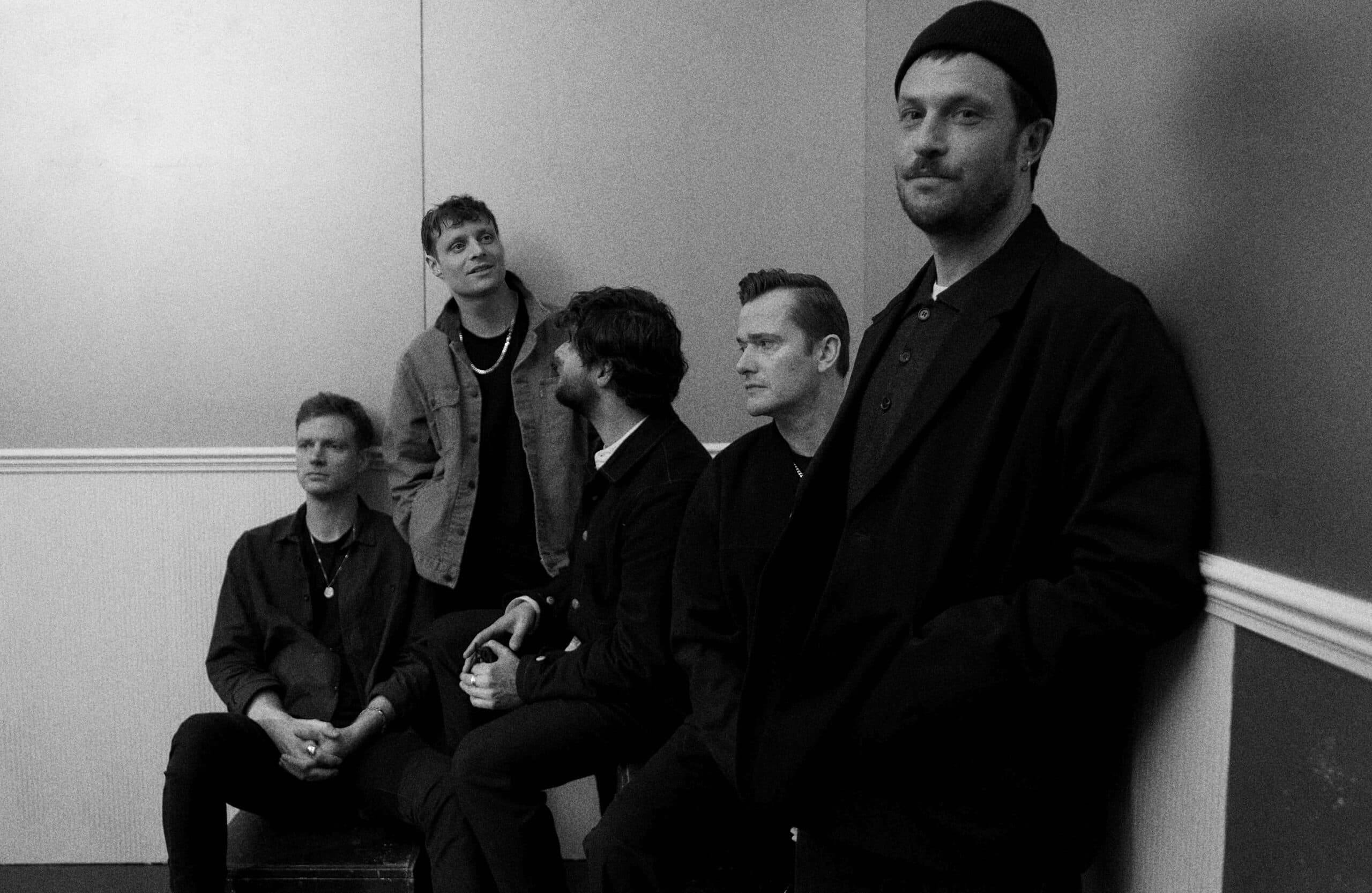
There was more of a DIY ethos, if you will — something felt by the whole scene and something that’s hard for contemporary artists to tap into. It was a vital part of the production of The Maccabees. “Do you remember [Orlando] used to do the late night calls around the time of the first album?” says Hugo. “He’d call you up and be like, ‘don’t answer your phone, I need to record this onto your voicemail.’ It would be bits of ‘Precious Time’ and all those songs.” “I used to make posters, but then forget to put a date on it,” adds Felix.

It’s fair to say that the five of them are in agreement — it would have been hard for The Maccabees to be The Maccabees in an era where, as Hugo puts it, “before a song is even finished or seen through, it’s road tested on TikTok.” Their reunion in 2025, though? That works. They might even get something different from it the second time round. “By the end of [The Maccabees], I was really struggling with stage fright,” says Orlando. “I don’t remember those big gigs as a pleasure. I’m genuinely excited to approach them with a very different head space.” “Fucking hell, no pressure then,” says Felix, who’s almost “scared” of how much he’ll “love it.” For Sam? “Hopefully it will just be a big celebration. And reconnecting with things in a different way to when it was our entire livelihood.” “When we did that last show, my wife was pregnant,” adds Hugo. “To be where we are now, when my child’s seven and he’s in the mix — that’s lovely.” If all goes well, the boys are even open to the idea of making new music. “We’re basically just one step at a time — see how summer goes,” says Sam. If that does happen, they know who to call for the music videos. This time round, I’ll have equipment that’s a little more sophisticated than my laptop webcam and Windows Movie Maker.
- PhotographerCharlie Cummings
- WriterAmber Rawlings
- ProducerAbby Rothwell
- Creative DirectionOli Jenson
- Director of PhotographyJoey Knox
- StylistMolly Ellison
- GroomerDominique Desveaux
- Set DesignerBrad Barrett
- Fashion AssistantsKajal Mehta and Isabel Mitchinson
- Set AssistantsCharlie Fowle and Sara Gleeson
- EditorSofiia Romanishina
